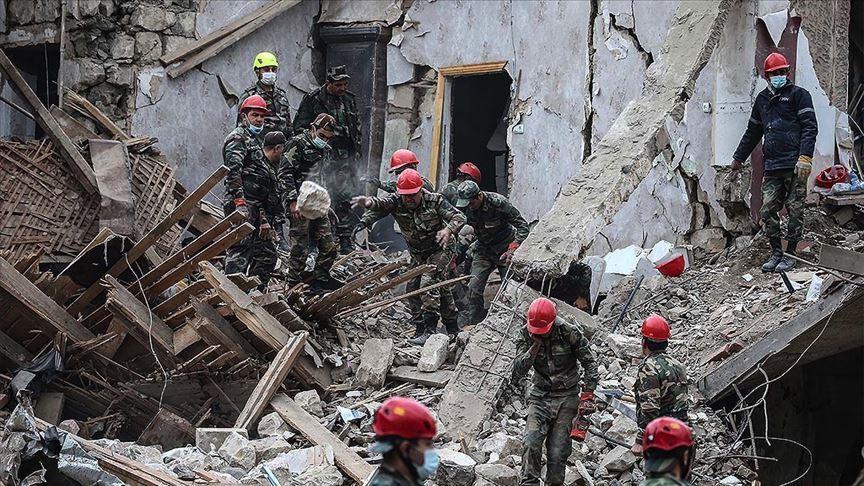
The counter-attack launched by the Azerbaijani army on Sept. 27 in order to end the 26-year-long occupation was remembered with significant military successes. As the Armenian army retreated, it attacked civilian targets behind the frontline with short and medium-range missiles. These attacks took place at a time when the “humanitarian ceasefire” was in effect. One day after the ceasefire declaration in Moscow on Oct. 11, the second biggest city of Azerbaijan, Ganja, was hit with a missile fired from Armenia. This was not the first time that civilian targets were hit by Armenia. Armenia hit the civilian places of Ganja, Mingecevir, Terter, Shamkir, Berde and other Azerbaijani cities, which are far behind the frontline. According to the data of the Azerbaijan prosecutor’s office, more than 40 Azerbaijani civilians lost their lives and 207 people were injured as a result of these attacks as of Oct. 12.
Vağarsak Harutunyan, the chief adviser to Armenian Prime Minister Nikol Pashinyan, stating, “We have developed heavy weapons for tactical attack. We will hit civilian targets to cause panic in the future” reveals that these attacks are not accidental but rather planned. Therefore, Armenia’s attack against civilians is considered to be a war tactic of the Republic of Armenia.
As stated by Harutunyan, the main goal of Armenia is to create panic and fear among the civilian population. The mobilization of the Azerbaijani people to support the front from the beginning of the recent clashes evidently increases the morale and motivation of the army fighting against the occupation. Beyond complying with the rules imposed by the military laws, the public did not spare any assistance to support the Azerbaijani army. President İlham Aliyev’s and Mehriban Aliyeva’s transfer of salaries to the armed forces aid fund set an example for many people. Rich people living in Azerbaijan and abroad sent aid to the fund of the armed forces. Political parties signed a joint declaration proclaiming their full support to President Aliyev and the state. Minorities of different religions living in Azerbaijan prayed for the success of the Azerbaijani army against the occupation.
There were two important reasons why Azerbaijani people supported the counter-attack in the front. First of all, the Azerbaijani state and people were aware that the main goal of the occupying Armenia was to destroy the social solidarity by applying psychological warfare tactics in the back front in order to weaken the frontline. Secondly, the public believed that the 26-year unsuccessful peace process was useless. In short, the support of all segments of the society in the military operation meant that the psychological war tactics applied by Armenia were unsuccessful. For this reason, the Armenian side aimed to disrupt the state-people-army solidarity by attacking civilians and creating fear and panic. At this point, Armenia did not also hesitate to threaten with terrorist acts.
Another goal of Armenia, which thinks that Baku will respond to the attacks of Yerevan against the civilian population of Azerbaijan, was to deflect the struggle of Azerbaijan against the occupation. In fact, Armenia used different methods at this point, particularly the accusation of Armenia to Turkey, claiming the involvement of foreign fighters. In addition, presenting this war as an instrument of Christian-Muslim war is also done to weaken the efforts of Azerbaijan to present its rightful struggle for a different cause.
Azerbaijan’s counter steps
The Armenian administration believed that Azerbaijan would not be able to hit the targets in Armenia. The Armenian administration thought that the CSTO and Russia would prevent Azerbaijan from using its right of self-defense within the framework of the U.N. Treaty. But neither Armenia’s membership of the CSTO nor the Armenian-Russian security agreement gives Yerevan the right to strike the civilian population. In this sense, the CSTO treaty states that the member states are strictly bound to the U.N. Treaty and the treaty text states that members cannot attack other states. As a matter of fact, the Azerbaijani army destroyed the missile systems that hit Azerbaijani civilian settlements within the borders of Armenia by using its right to self-defense.
Apart from that, Azerbaijan started preparations to use its legal and diplomatic rights by collecting the evidence regarding the attack. The Azerbaijani chief prosecutor’s office collected information on all attacks on civilian targets and those who ordered the attack. Especially those responsible for this issue are Armenia’s current administrators, Pashinyan and Defense Minister David Tonoyan. After that, a meeting was held with the representatives of all foreign embassies in Azerbaijan, who then were taken to Ganja where the attack took place. Azerbaijan will take an advantage of the successful public diplomacy experience which it has carried out for years and wage a just struggle against the Armenian authorities.
Dr. Cavid Veliyev is from the Center of Analysis of International Relations